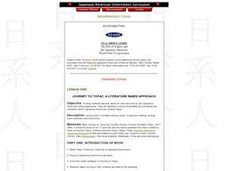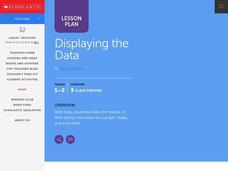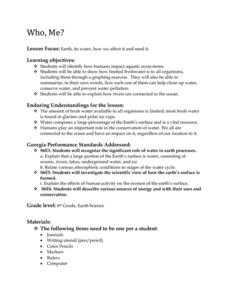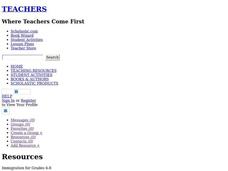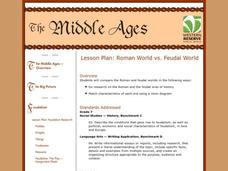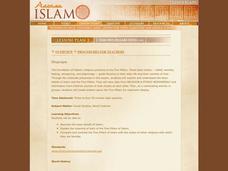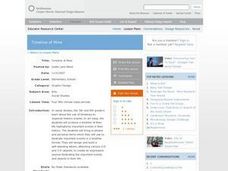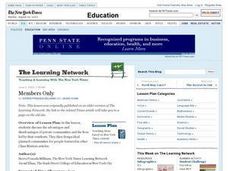Curated OER
Journey to Topaz, a Literature Based Approach
Students view a video clip of the experiences of Japanese-Americans during World War II. They read parts of a book in which a child tells her story about living in the internment camps. They participate in a simulation activity as well.
Curated OER
It's About Time
In collaborative teams, students create individual autobiographical presentations that help them investigate their historical background. As they collaborate and create their projects they discuss and come to realize how current...
Curated OER
Letters from Rifka
Learners read Karen Hesse's book "Letters from Rifka" and explore how it presents the experiences of a Russian immigrant to America. They research and write reports on the experiences of various immigrants from different cultures, keep...
Curated OER
Dorothea Lange
Students explain that a person's experiences influence their life, write a time line of their life, and analyze Dorothea's photographs and list descriptive words.
Curated OER
The Hall of Physicist
Students study the history and scientific contributions of Albert Einstein. In this Albert Einstein lesson plan, students learn his history, research his scientific contributions, create a timeline of him and his work, and create a...
Curated OER
Napoleon Forges an Empire
In this world history instructional activity, students note the goals and results of 5 of Napoleon's actions and write a brief explanation of how he gained power in France.
Curated OER
What Building Used to Be There?
Students examine how their city has changed and examine building preservation. In this building preservation lesson plan, students listen to a reading of Virginia Lee Burton's, The Little House, before making a time line of how their own...
Curated OER
Timeline
Tenth graders examine the Holocaust from a chronological perspective. In this Holocaust lesson, 10th graders create parallel timelines on a poster about the Holocaust.
Curated OER
Displaying The Data
Students engage in a research project to find information about one's personal family heritage. They collect information by conducting family interviews. Students use the data to create a graph, map, and timeline. Then students take part...
Curated OER
Sequence of Events Storyline
Seventh graders practice sequencing the events in a story they have read. After reading a short story, 7th graders sequence the events of the story using a timeline. Their timeline is used to create a summary paragraph of the story...
Curated OER
Who Me?
Students examine their place in society by looking closely at themselves as well as their role in their family and community. Students also examine the origin of the National Parks system and how it contributes to National Identity.
Curated OER
Testing the Hypothesis
Students create and conduct various experiments to determine the origin of a family artifact, and then determine whether their results were successful. Students summarize their results and evaluate whether their hypotheses were correct.
Curated OER
Myth of the Western Man
Pupils identify ways in which history and culture influence identity. They make a time-line and research dates to identify their significance, as well as, create a self portrait pictorially or verbally, that explores the complexity of...
Curated OER
Rethinking Time, Age, And the Calendar
Students creat personal timelines, marking key events in their lives. They discuss the different events with a small group. They analyze how Western Civilization influenced their timeline in comparison to Eastern Asia.
Curated OER
Immigration for Grades 6-8
Middle schoolers explore immigration. In this immigration instructional activity, students research the topic and compare immigration of the past to the present. They create a decade long timeline of immigration.
Northeastern Educational Television of Ohio, Inc.
Roman World vs. Feudal World
Young historians compare the major features of the Roman and feudal worlds, such as religion, social hierarchy, and political tenets, using online resources and group discussion.
Curated OER
The Five Pillars of Islam
In order to better understand Muslim civilization, culture, and politics one must first familiarize themselves on the 5 Pillars of Islam, ideas which dominate much of Muslim societal and cultural norms. Provide your learners with a...
Alabama Learning Exchange
CELEBRATE!
Strengthen research skills by reviewing the months of the year and the holidays celebrated during those months. Learners draw and label a timeline for the months and label each holiday. They work in groups to research the holidays, and...
Curated OER
Timeline of Mine
Learners create a 3-D self-standing album containing an accurate timeline of his/her life. They select personal items to attach to the timeline (like jewelry, photos, etc.). Also, they create journals as keepsakes for themselves and...
Curated OER
Members Only
Students discuss the advantages and disadvantages of private communities and the lives led by their residents. They design ideal planned communities for people featured in other Class Matters articles.
Curated OER
Exploration--Widening Our Horizons
Students examine the difficulties of exploration and some of the motivations for exploration. They investigate various types of explorers and identify the difficulties faced by the New World explorers. Students create a journal of...
Curated OER
They're Only Children
Third graders compare how the lives of African American slave children differed from children's lives today. In this analysis of slavery lesson, 3rd graders evaluate and discuss the conditions of slavery in collaborative groups....
Curated OER
Pilgrims in Style
Young scholars explore the Pilgrims and their clothing. They discuss current trends in fashion and complete a Venn diagram comparing the Pilgrim attire to present day clothing and research websites regarding the Pilgrims. After...


